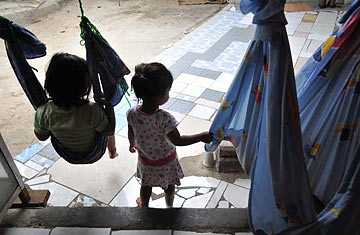
No one knows if 1-year-old Yunus will ever see his mother again. Like 6 million other Indonesians, she traveled far from home to find employment. She was hired by a wealthy family in Saudi Arabia. But one day, while on her boss's property, she went to check on some goats and, according to what is known of her tale, was raped by two men. Yunus was conceived of that assault.
The two women raising the boy hope he never learns about his mother — let alone his real father. The stigma of such a birth is so heinous that Yunus' mother gave him up to Normawati, 50, and her close friend Ibu Herlina, 53, who describe themselves as Yunus' adoptive grandmother and mother, respectively. However, the child's situation is not unique, and Normawati (who like many Indonesians goes by a single name) is not unused to it. Indeed, the campaigner for migrant-worker rights and her daughter are raising several children of half-foreign parentage who were abandoned by raped migrant mothers. There are dozens of children of similar backgrounds in Jakarta and its environs.
While globalization has turned much of the world into a wide-open labor market, it has also created complex human and societal dramas. Women account for up to 50% of the world's 100 million–strong migrant-worker population — and there is no effective entity to protect their rights and dignity. In 2008, Indonesians working abroad, commonly as domestic staff in the Middle East and parts of Asia, contributed about $6.8 billion to their national economy via remittances, according to the World Bank. And while statistics are difficult to come by, there are increasing reports of many who are physically abused, raped and — in some cases — killed by their employers.
While cases of death at the hands of overseas employers are relatively rare, Normawati says she has seen countless pregnant Indonesians coming through the gates of Jakarta's Soekarno-Hatta International Airport after working abroad. She says the most disturbing of experiences can be heard again and again from the lips of different women: "The boss tells the woman, 'You must be with me.' Then rape."
The story behind Yunus' conception isn't even exclusive in his new home, which is not far from the airport. His adopted sister Nadia, who celebrated her first birthday on Nov. 1, was born following the rape of her mother in Kuwait. Both children were born in Jakarta and were almost immediately placed into Ibu Herlina's care. Their adopted mother points out that the children share "Arab" facial features, in contrast to most of their siblings, who have "Asian looks." Her home, consisting of a modest house and a dormitory-like shelter, is filled with 10 children who were abandoned by migrant workers. Only a few of the biological mothers have made contact with their children.
The abuse of Indonesian workers in some countries has become so notorious that Jakarta is considering placing bans on labor migration to specific destinations. Manpower and Transmigration Minister Muhaimin Iskander says workers may soon be prevented from entering Saudi Arabia and Jordan if a "thorough review" shows that those governments are providing insufficient protections for Indonesian workers.
In many cases, Normawati explains, female migrant workers are raped and then dumped on the streets by their employers, who refuse to give them their passports after discovering that the women are pregnant. The women are then arrested by police and placed in jail. Sometimes they are deported before the child is born. Herlina claims that airport officials have called her to ask what to do with the babies who are left behind by mothers.
Normawati says there are dozens of children who were abandoned by migrant workers in homes throughout Jakarta and surrounding areas. "I'm in my house one or two days a week," she says. "I travel to see my grandchildren" — as she calls the abandoned infants. Normawati and Herlina sustain their wards by way of donations as well as assistance from the families of some of the children, who are nevertheless too ashamed to raise the children themselves.
While the abandonment of the children depresses her, Herlina thinks it is better that they stay in her care. Their biological mothers are often married and have other children, she says, and the husbands who stay in Indonesia while the women work abroad are often not the type to welcome another man's offspring. It is rare for a biological mother to contact Herlina after giving away her child. Normawati agrees that many men are "sensitive" about such issues. "If the migrant worker takes her baby [to raise herself], three things could happen," she says. The first is the most common: "The husband gets angry and wants a divorce. The second one is [the woman] doesn't go home," abandoning what was once a stable home to go off on her own with her child. The third thing that could happen? It is the rarest: "The husband will accept the child."
